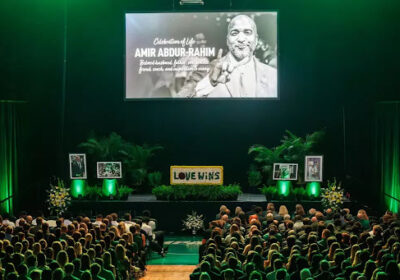Ron Paul to champion individual liberty

The last time Ron Paul visited USF, the then-presidential candidate rallied thousands of supporters with his vision of liberty. Tonight, the retired congressman returns after two years with a message of resilience.
“Change comes from the people,” he said in an interview with The Oracle. “That’s why I concentrate on a generation of young people who can make a change.”
Paul said that change is the reclamation of liberty, which he defines as the natural right to say and do whatever an individual sees fit, as long as no harm is done and tolerance is embraced.
“If we follow individual liberty we would have a much more prosperous society,” he said. “We would have a much more peaceful society that honors and respects a person’s own interest in their life and their money.”
When Paul looks at the direction in which the U.S. is headed, he said the country is moving away from the founding ideals that promoted individual liberty over collective security.
Privacy, he said, is one aspect of freedom that citizens appear willing to sacrifice.
“Everyone knows that the government knows everything about everybody, and every day they seem to know more,” he said. “What has happened is that people have changed their notion of what government is for.”
Paul said U.S. citizens are growing doubtful of their ability to face the world, so instead they relinquish control and responsibility to those in power.
“The government is supposed to be set up to protect liberty, not to make you perfectly safe or to give you perfect economic security,” he said. “Anything that scares, now people say, ‘What’s the government going to do?’”
The Ebola crisis, he said, is an example of citizens overreacting and looking to the government for a promise of safety.
But it is young people, Paul said, who are the likeliest to take back the reigns of individual liberty.
“I think a lot of young people understand this better than people who are now adjusted,” he said. “That’s why I believe the message I’ve been delivering is so well received on college campuses.”
Paul became a cultural icon during his presidential bids, especially among youth. He said he resonates with young people because they distrust conventional wisdom and eagerly wish to make history their own.
“Young people know they’ve heard nonsense, generally speaking,” he said. “There are professors around now who talk like how I talk, but there’s not very many.”
The entire system of education is something Paul would like to change. He said online courses and privatized education would offer a cheaper alternative to modern universities.
“Students find their degree isn’t worth as much as people thought it should be worth,” he said. “They end up with a lot of debt and they’re having trouble finding a good job to pay off the bills.”
However, Paul said it’s not entirely the fault of education. Much of it is due to economic planning based on the Federal Reserve’s manipulation of money and credit, he said, and overspending.
“Just as communism and fascism was proven destructive in the 20th century, we’re in the midst of proving the failure of Keynesian economics,” he said. “We need another option and that option is a different approach to free market economics.”
Though the midterms brought in Republicans more likely to bolster free markets, Paul said it’s only change of those in power rather than a shift in philosophy.
“I wasn’t crying over seeing Harry Reid getting bumped from power,” he said. “The one thing I worry about is that the new people are going to be closer to the militancy of John McCain than they will be of my son Rand.”
Whether Senator Rand Paul runs for president or stays in Congress, his father said the resolve must come from the people at the bottom.
“If the people still insist their congressmen vote for more war and no monetary reform, nobody can do much,” he said. “If they didn’t, Congress wouldn’t vote this way.”
Even if more people take his message to heart, Paul said reform would take time and patience.
“I didn’t go to Washington and expect to be successful by giving a fancy speech and converting all of Congress,” he said. “I would have to forget all about the lobbyists and the power behind the system.”
Inside or outside Congress, Paul said his goal is to change the attitude of the people — the rest will follow.
“I never had any major legislation, but I reached a lot of people,” he said. “It’s just different today, I have more free time to go where I want to go rather than spending time in Washington spinning my wheels.”
Though he is retired at 79 years old, Paul said talking to youth inspires him to continue delivering his political message.
“I got a lot of credit for energizing young people,” he said. “The truth is that it’s probably a mutual deal.”
Paul said he hopes his lecture tonight at 8 in the Marshall Student Center Ballroom motivates students. According to Paul’s contract, the event will cost $40,000 and include a Q&A with the audience and a book signing.
“I used to go to little clubs of 15 or 20 people hoping to convert two or three. Now the numbers are much greater,” he said. “It’s more enjoyable because my goal is to get people to consider a different philosophy than we’ve been following.”







